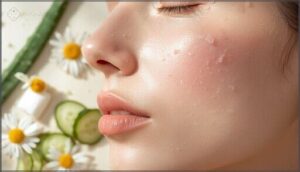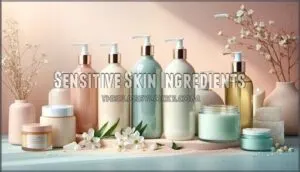This site is supported by our readers. We may earn a commission, at no cost to you, if you purchase through links.

Look for cleansers like La Roche-Posay Micellar Water or Dove Sensitive Skin Beauty Bar. Moisturizers with ceramides, glycerin, or hyaluronic acid—think CeraVe Skin Renewing Night Cream or First Aid Beauty Ultra Repair Cream—help lock in moisture and soothe irritation.
Avoid strong exfoliants or heavy fragrances, since those can stir up trouble. The right products can turn your skincare routine from a battlefield into a safe haven.
Curious which eight picks made the cut?
Table Of Contents
- Key Takeaways
- Sensitive Skin Causes
- Sensitive Skin Symptoms
- Sensitive Skin Care Tips
- 8 Best Products for Sensitive Skin
- 1. La Roche-Posay Micellar Water Sensitive Skin
- 2. Dove Sensitive Skin Beauty Bar 14-Count
- 3. TONYMOLY Ceramide Mochi Toner Hydrating
- 4. First Aid Beauty Ultra Repair Cream
- 5. Vichy Aqualia Thermal Rich Face Cream
- 6. Cetaphil Moisturizing Cream Dry Sensitive Skin
- 7. CeraVe Skin Renewing Night Cream
- 8. Aveeno Calm Restore Face Serum
- Sensitive Skin Ingredients
- Managing Sensitive Skin
- Frequently Asked Questions (FAQs)
- What can I use for highly sensitive skin?
- Which things are good for sensitive skin?
- What are the 4 types of sensitive skin?
- What to avoid in skincare for sensitive skin?
- Can sensitive skin develop suddenly during adulthood?
- How long should patch testing last?
- Whats the difference between sensitive and allergic reactions?
- Can diet changes improve sensitive skin conditions?
- Is sensitive skin hereditary or genetic?
- Conclusion
Key Takeaways
- Choose gentle, fragrance-free formulas – You’ll want products with ceramides, glycerin, and hyaluronic acid that strengthen your skin barrier without triggering reactions.
- Avoid harsh ingredients that cause irritation – Skip products with sulfates, high-concentration acids, essential oils, and alcohol-based toners that’ll compromise your already-sensitive skin.
- Patch-test new products before full application – You should test any new skincare product on your inner arm for 48-72 hours to check for reactions before using it on your face.
- Simplify your routine for better results – You don’t need a 10-step regimen – focus on four basics (cleanser, moisturizer, serum, SPF) with minimal ingredients to reduce irritation risk.
Sensitive Skin Causes
Your skin becomes sensitive when environmental factors like pollution, UV rays, and temperature changes compromise its protective barrier.
Your skin’s protective barrier is your first line of defense against daily irritants and environmental damage.
Lifestyle elements such as stress, hormonal fluctuations, and harsh skincare products can also trigger sensitivity reactions that leave your skin red and irritated.
Environmental Factors Causing Sensitive Skin
Your skin faces a daily assault from environmental factors that can trigger sensitivity.
UV radiation breaks down your skin’s protective barrier, while air pollution deposits irritating particles that cause inflammation.
Temperature extremes—whether scorching heat or bitter cold—stress your skin, and humidity levels affect moisture balance.
Seasonal changes bring shifting conditions that challenge even resilient skin, making environmental protection essential for managing skin sensitivity.
A simple routine can help, especially when using fragrance-free products, which is a key part of managing skin sensitivity with the right skin care and fragrance-free approach.
Lifestyle Factors Contributing to Sensitive Skin
Your daily habits can make or break your skin’s comfort levels.
Sleep deprivation disrupts your skin’s natural repair cycle, while chronic stress triggers inflammatory responses that worsen sensitivity.
Poor hydration levels leave your skin barrier vulnerable to irritants, and dietary influence from processed foods can increase inflammation.
Regular exercise improves circulation but excessive sweating may irritate sensitive skin without proper cleansing, which is crucial for maintaining healthy skin and preventing irritants.
Sensitive Skin Symptoms
Recognizing sensitive skin symptoms helps you choose the right products and avoid unnecessary irritation.
You’ll typically experience redness, itching, burning sensations, or tightness when your skin reacts to environmental factors or skincare ingredients.
Redness and Inflammation
When you’re dealing with sensitive skin, redness and inflammation often become your unwelcome companions.
Sensitive skin turns everyday products into potential enemies, making even the gentlest touch feel like sandpaper.
These inflammation triggers can turn your complexion into a roadmap of irritation, but understanding what’s happening helps you find the right redness relief.
Common signs include:
- Blotchy, red patches across your face
- Heat sensation that feels like mild sunburn
- Visible blood vessels beneath the skin surface
- Persistent flushed appearance even without triggers
Calming skincare with soothing ingredients like ceramides and niacinamide provides anti-inflammatory skincare benefits.
These barrier repair compounds help restore your skin’s natural defenses while reducing ongoing skin inflammation through gentle, consistent care.
Itching and Flakiness
Two telltale signs reveal when your skin barrier needs backup: relentless itching that creates a Scratching Cycle and visible flaking that screams for Hydration Methods.
Smart Preventative Measures target both simultaneously through Barrier Repair and Soothing Ingredients in sensitive skin products.
| Itching Triggers | Flaking Solutions |
|---|---|
| Dry skin patches | Gentle exfoliation |
| Skin irritation | Ceramide moisturizers |
| Compromised barrier | Hyaluronic acid serums |
Burning and Stinging Sensations
That burning sensation hits when nerve irritation strikes your sensitive skin, triggering pain receptors that make even gentle products feel harsh.
This stinging response signals your skin barrier needs serious TLC.
Common burning triggers:
- Fragrance-heavy products – ditch scented lotions immediately
- Alcohol-based toners – they strip protective oils away
- High-acid formulas – salicylic acid over 0.5% causes trouble
- Essential oils – peppermint and citrus oils burn sensitive faces
- Harsh cleansers – sulfates create redness and irritation
Choose powder cosmetics over creams when possible, and prioritize easy product removal. TRPV1 inhibitors in specialized formulas can calm these nerve responses. Always check stability testing on new products before committing.
Sensitive Skin Care Tips
You’ll need a gentle approach that protects your skin’s delicate barrier while addressing sensitivity concerns.
The key is choosing products specifically formulated for reactive skin types that won’t trigger irritation or worsen existing symptoms.
Gentle Skincare Routines
When those stinging sensations hit, you’ll want a gentle skincare routine that won’t aggravate your skin further. Routine simplification works best—stick to four basic steps rather than complicated regimens.
| Morning Routine | Evening Routine |
|---|---|
| Gentle cleanser | Oil-based cleanser |
| Hydrating serum | Treatment serum |
| Moisturizer + SPF | Night moisturizer |
Start with patch testing new sensitive skin products on your inner wrist. Gradual introduction prevents reactions—add one product weekly. Product layering helps: apply thinnest to thickest consistency. Ingredient elimination means ditching fragrances and harsh actives that trigger flare-ups.
To further minimize irritation, consider using hypoallergenic skincare options.
8 Best Products for Sensitive Skin
Finding the right products for sensitive skin doesn’t have to feel like searching for a needle in a haystack.
These eight dermatologist-recommended picks work gently while delivering real results, so you can finally stop worrying about irritation and start enjoying healthy-looking skin.
1. La Roche-Posay Micellar Water Sensitive Skin
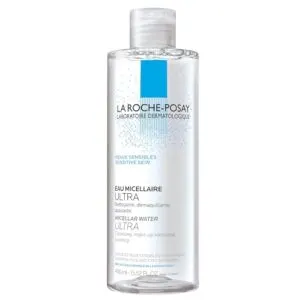
Transform your cleansing routine with La Roche-Posay’s micellar water—it’s like having a makeup magnet in a bottle.
This gentle 3-in-1 solution cleanses, tones, and removes makeup without harsh rubbing or rinsing.
You’ll love how it dissolves 99% of makeup, including stubborn foundation, while the 5% glycerin keeps your skin hydrated.
The thermal spring water soothes irritation, making it perfect for reactive skin.
Just press a cotton pad to closed eyes, then gently wipe away, using it as a makeup magnet.
Best For: People with sensitive or reactive skin seeking a gentle, all-in-one makeup remover and toner that doesn’t require rinsing.
- Removes 99% of makeup—including long-wear foundation—without harsh rubbing
- Hydrates and soothes skin thanks to 5% glycerin and thermal spring water
- Fragrance-free or lightly scented, alcohol-free, and non-irritating even on delicate eye areas
- May not fully remove waterproof mascara or heavy eye makeup
- Some users find the bottle size small for the price
- Light fragrance in certain versions could be noticeable for those extremely sensitive to scent
2. Dove Sensitive Skin Beauty Bar 14-Count
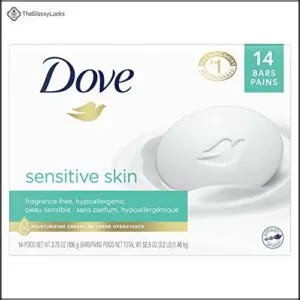
This gentle cleanser won’t leave your face feeling tight like traditional soap.
Dove’s Sensitive Skin Beauty Bar contains ¼ moisturizing cream, making it fragrance-free and hypoallergenic for reactive skin types.
You’ll appreciate that it’s dermatologist-recommended and certified cruelty-free by PETA.
The pH-balanced formula effectively removes dirt while maintaining your skin’s natural moisture barrier.
Users with eczema consistently praise its ability to cleanse without causing irritation or dryness, making it a great option for those with sensitive skin.
Best For: Anyone with sensitive, dry, or eczema-prone skin who wants a gentle, fragrance-free cleanser for face and body.
- Some users find the bars don’t last as long as expected.
- Rare reports of an unusual scent despite being unscented.
- May not provide enough cleansing for heavy makeup or oily skin.
- Hypoallergenic and fragrance-free, reduces risk of irritation.
- Contains ¼ moisturizing cream to nourish and protect skin.
- PH-balanced and dermatologist-recommended for daily use.
3. TONYMOLY Ceramide Mochi Toner Hydrating
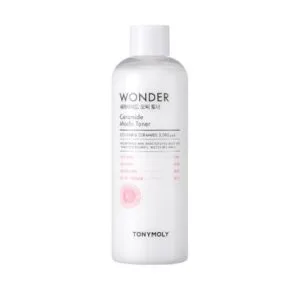
Looking for a gentle toner that won’t irritate your sensitive skin? TONYMOLY’s Ceramide Mochi Toner delivers impressive hydration without harsh chemicals.
This milky formula combines ceramides to strengthen your skin barrier with centella asiatica to calm redness and irritation.
You’ll appreciate the hyaluronic acid and panthenol that lock in moisture, creating that coveted bouncy texture.
The EWG Green formula stays alcohol-free and hypoallergenic, making it perfect for daily use. At 16.9 ounces, it’s excellent value for money.
Best For: Anyone with sensitive, dry, or combination skin looking for a soothing, deeply hydrating toner without harsh ingredients.
- Strengthens the skin barrier and locks in moisture with ceramides and hyaluronic acid
- Calms redness and irritation thanks to centella asiatica and a hypoallergenic formula
- Large 16.9 oz bottle offers great value and long-lasting use
- Packaging lacks a pump, making dispensing less convenient
- Contains a mild, sweet scent that may not suit those preferring unscented skincare
- Large size may not be ideal for travel or small storage spaces
4. First Aid Beauty Ultra Repair Cream
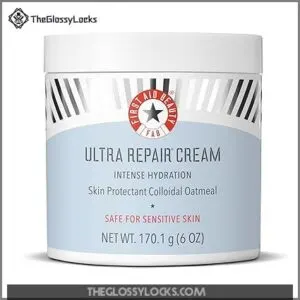
This powerhouse moisturizer packs colloidal oatmeal and ceramides to tackle your most stubborn skin concerns.
You’ll get 24-hour hydration that immediately improves skin moisture by 169%, making it a game-changer for eczema-prone or chronically dry skin.
The whipped texture absorbs quickly without leaving residue, while its extensive free-from list means you can trust it won’t trigger reactions.
Though pricier than drugstore options, a little goes far, making this dermatologist-recommended cream worth every penny for sensitive skin relief.
Best For: People with very dry, sensitive, or eczema-prone skin who want fast, effective, and gentle hydration.
- Clinically proven to provide immediate and long-lasting relief for dry, irritated, or eczema-prone skin.
- Free from harsh chemicals, artificial fragrances, alcohol, and common allergens.
- Lightweight, non-greasy texture absorbs quickly and works for face, hands, and body.
- More expensive than typical drugstore moisturizers.
- Some users notice a slight residue after application.
- Packaging may lack protective seals, raising sanitation concerns during shipping.
5. Vichy Aqualia Thermal Rich Face Cream
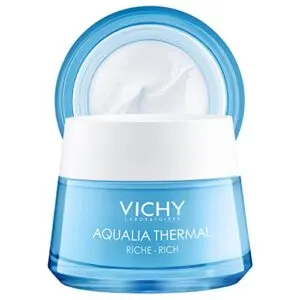
With its mix of thermal water and hyaluronic acid, this French pharmacy favorite delivers serious hydration for sensitive skin.
You’ll get 48 hours of moisture from pure hyaluronic acid and plant sugars, while Vichy’s mineral-rich volcanic water strengthens your skin barrier.
The fragrance-free formula won’t trigger reactions, and 97% natural ingredients keep irritation at bay.
Users love how it smooths fine lines without feeling greasy or heavy under makeup, making it perfect for daily use.
Best For: Those with dry, sensitive, or easily irritated skin who need deep hydration and a gentle, fragrance-free formula.
- Delivers long-lasting 48-hour hydration with hyaluronic acid and plant sugars.
- Strengthens the skin barrier with Vichy mineral-rich volcanic water.
- Lightweight, non-greasy and absorbs easily—suitable under makeup.
- May leave some residue or pill under certain makeup products.
- Not hydrating enough for extremely harsh winter climates.
- Can be difficult to find in some countries due to regional discontinuation.
6. Cetaphil Moisturizing Cream Dry Sensitive Skin
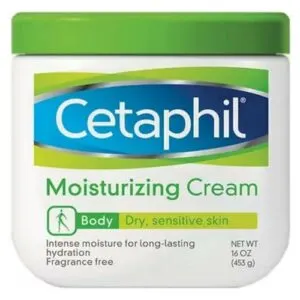
This heavyweight moisturizer delivers serious hydration for chronically dry, sensitive skin.
You’ll get up to 48 hours of moisture thanks to its extra-strength emollients and humectants that bind water to your skin.
It’s fragrance-free, non-comedogenic, and skips parabens and lanolins that often trigger reactions.
The formula absorbs within 20 minutes without leaving a greasy residue.
Whether you’re dealing with eczema flare-ups or winter’s harsh bite, this cream works overtime to restore your skin barrier and keep irritation at bay, providing serious hydration for chronically dry skin.
Best For: People with chronically dry, sensitive skin who need intense, long-lasting hydration without irritation.
- Deeply hydrates and helps restore the skin barrier for up to 48 hours
- Free from fragrances, parabens, and lanolins, making it safe for sensitive skin
- Absorbs quickly and doesn’t leave a greasy residue
- Large 16oz size may be inconvenient for travel
- Can take up to 20 minutes to fully absorb into the skin
- Shipping costs may be high unless bundled with other products
7. CeraVe Skin Renewing Night Cream
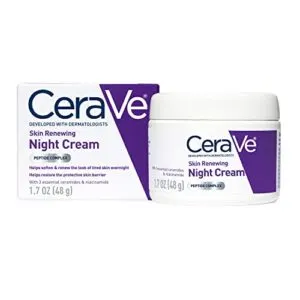
CeraVe’s night cream transforms your sensitive skin while you sleep.
You’ll wake up to smoother, more hydrated skin thanks to its triple ceramide complex and hyaluronic acid.
The peptides work overtime to tackle fine lines, while niacinamide soothes irritation.
This fragrance-free formula won’t trigger reactions like many night creams do.
Its MVE technology releases moisture gradually for 24-hour hydration.
You can even use it during the day under makeup without greasiness.
Best For: People with dry, sensitive, or aging skin who want deep overnight hydration without irritation.
- Restores and hydrates skin with ceramides, hyaluronic acid, and peptides.
- Non-greasy, fragrance-free, and suitable for sensitive skin.
- Can be used day or night, even under makeup.
- May make oily skin feel oilier.
- Small packaging may not last with generous use.
- Not everyone sees the same anti-aging results.
8. Aveeno Calm Restore Face Serum
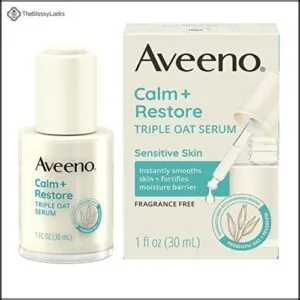
When you’re dealing with reactive skin that flares up at the drop of a hat, Aveeno’s Calm + Restore Triple Oat Serum steps in as your gentle guardian.
This lightweight formula combines triple oat complex with calming feverfew to soothe irritation and reduce redness effectively.
You’ll appreciate its hypoallergenic, fragrance-free design that won’t trigger reactions.
The serum absorbs quickly without leaving sticky residue, making it perfect for layering under makeup.
Users report smoother, less reactive skin after just one use, with 92% experiencing instant improvement.
Best For: Anyone with sensitive, dry, or eczema-prone skin looking for a gentle, soothing serum to reduce redness and irritation.
- Instantly calms and hydrates irritated skin, reducing redness.
- Hypoallergenic, fragrance-free, and safe for very sensitive skin types.
- Absorbs quickly with a lightweight feel, perfect under makeup.
- Dropper is hard to use due to thick serum consistency.
- Small bottle size may not last long for the price.
- May feel slightly sticky at first and sting on very irritated skin.
Sensitive Skin Ingredients
When choosing skincare products for sensitive skin, you’ll want to focus on ingredients that calm and protect rather than irritate.
Look for gentle powerhouses like glycerin and ceramides that strengthen your skin’s natural barrier, while steering clear of harsh exfoliating acids and high-concentration retinol that can trigger reactions.
Beneficial Ingredients Like Glycerin and Ceramides
For sensitive skin products, glycerin and ceramides work like a power duo.
Glycerin’s humectant properties draw moisture from the environment, boosting hydration for 48 hours.
Meanwhile, ceramides rebuild your skin’s protective barrier, reducing moisture loss by 24%.
This hydration synergy creates stronger, calmer skin that’s less reactive to irritants.
Glycerin also functions as a natural moisturizing factor, enhancing its benefits.
Cautionary Ingredients Like Exfoliating Acids and Retinol
While beneficial ingredients help your skin, certain actives can trigger flare-ups.
Exfoliating acids like glycolic and lactic acid often cause burning and hyperpigmentation in sensitive types.
Retinol increases photosensitivity and irritation, especially when starting.
Consider PHA benefits over harsh AHAs, try retinol alternatives, or practice buffering retinol with moisturizer for gradual introduction.
Both retinol and AHAs/BHAs can stimulate collagen production, offering cumulative skin benefits with proper use of retinol alternatives.
Importance of Natural Ingredients Like Aloe and Chamomile
While harsh chemicals can backfire, natural ingredients like aloe and chamomile offer gentle relief for sensitive skin.
Aloe Benefits include deep skin hydration and anti-inflammatory properties that calm irritation without clogging pores.
Chamomile Effects provide antibacterial action and reduce redness effectively.
These Plant Compounds deliver Natural Soothing that works with your skin, not against it.
Many users find aloe soothes sensitive skin to be an effective solution for their skin issues, highlighting the gentle relief it provides.
Managing Sensitive Skin
Managing sensitive skin doesn’t mean you need a complicated routine with dozens of products.
You’ll get better results by keeping things simple and focusing on gentle, barrier-supporting ingredients that strengthen your skin’s natural defenses.
Simplifying Skincare Routines
Your skin doesn’t need a 10-step routine to thrive. A minimalist approach works best for sensitive skin – think quality over quantity. Gentle cleansing, moisturizing, and sun protection form the perfect foundation.
Fewer actives mean less chance of irritation, while strategic product layering helps ingredients work together harmoniously. A consistent skincare routine yields long-term results.
- Start with patch testing new products on your inner arm before applying to your face
- Build your sensitive skin routine around four basics: cleanser, serum, moisturizer, and SPF
- Choose minimal ingredient skincare with simple formulas over complex multi-active products
Avoiding Common Irritants Like Fragrances and Sulfates
You’ll want to become a detective when reading product labeling – fragrances and sulfates hide behind sneaky names.
Fragrance alternatives like "parfum" or "aromatic compounds" can still trigger reactions.
Sulfate-free cleansers help, but watch for sodium lauryl sulfate’s cousins, as hidden ingredients matter more than fancy marketing claims for sensitive skin protection.
Using Barrier-supporting Ingredients to Strengthen The Skin Barrier
Since ceramides constitute about 50% of your skin’s natural lipids, replenishing them through targeted skincare becomes essential for barrier repair.
Look for products containing ceramides, glycerin, and niacinamide—these ingredients work together to strengthen your skin’s protective barrier.
You can find various ceramide products to help restore your skin.
Squalane provides additional lipid replenishment while supporting your skin microbiome, creating a foundation for long-term barrier health and reduced sensitivity.
Frequently Asked Questions (FAQs)
What can I use for highly sensitive skin?
You’ll need gentle, fragrance-free products with ceramides and hyaluronic acid. Skip harsh acids, retinol, and essential oils. Try CeraVe Hydrating Cleanser, barrier-repair serums, and always patch-test new products first.
Which things are good for sensitive skin?
Gentle cleansers, fragrance-free moisturizers, and ceramides work best for you. Look for hyaluronic acid, niacinamide, and soothing ingredients like aloe or chamomile while avoiding harsh acids, fragrances, and sulfates.
What are the 4 types of sensitive skin?
The four types of sensitive skin include reactive skin that reddens from products, acne-prone sensitive skin that breaks out easily.
The other types are rosacea-affected skin with persistent redness, and contact-sensitive skin that reacts to specific allergens or irritants.
What to avoid in skincare for sensitive skin?
Fragrances and essential oils trigger reactions in 60-80% of sensitive individuals, making avoidance imperative.
Skip fragrances, sulfates, high-concentration acids, alcohol-based toners, and harsh physical scrubs that’ll irritate your already-compromised skin barrier, including sensitive individuals.
Can sensitive skin develop suddenly during adulthood?
Yes, you can develop sensitive skin suddenly in adulthood. Stress, hormonal changes, environmental factors, harsh skincare products, or underlying conditions like rosacea can trigger sensitivity that wasn’t there before.
How long should patch testing last?
Picture yourself gently dabbing a tiny amount of product behind your ear – that’s your skin’s testing ground.
You’ll want to wait 48-72 hours to see if redness, itching, or irritation develops before using any new skincare product on your face, which is a critical step in ensuring your skin’s safety.
Whats the difference between sensitive and allergic reactions?
Sensitive reactions happen when your skin’s barrier is compromised, causing burning or stinging from products.
Allergic reactions involve your immune system attacking specific ingredients, creating rashes or hives that persist longer, which can be considered as allergic reactions.
Can diet changes improve sensitive skin conditions?
Your body’s incredible healing power can transform your skin from the inside out.
Diet changes absolutely can improve sensitive skin conditions.
Anti-inflammatory foods like omega-3 fatty fish, berries, and leafy greens help calm irritation, while avoiding trigger foods reduces flare-ups.
Is sensitive skin hereditary or genetic?
Genetics play a role in your skin’s sensitivity, but it’s not entirely predetermined.
You’re more likely to have sensitive skin if your parents do, since you inherit certain skin barrier characteristics and inflammatory responses that make reactions more probable.
Conclusion
Finding the right products to use for sensitive skin doesn’t have to feel like traversing a minefield.
Your skin’s comfort depends on choosing gentle, fragrance-free formulas that respect your skin’s delicate balance.
These eight carefully selected products offer proven ingredients like ceramides, glycerin, and hyaluronic acid to soothe irritation while strengthening your skin barrier.
Remember to patch-test new products and introduce them gradually into your routine for best results.
- https://pmc.ncbi.nlm.nih.gov/articles/PMC5595600/
- https://www.100percentpure.com/blogs/feed/10-ingredients-to-avoid-if-you-have-sensitive-skin
- https://www.youtube.com/watch?v=W5DgWn-Emb0
- https://www.sephora.com/buy/skincare-products-for-sensitive-skin
- https://www.cerave.com/skin-smarts/skin-concerns/sensitive-skin/how-to-manage-sensitive-skin-in-different-skin-types


